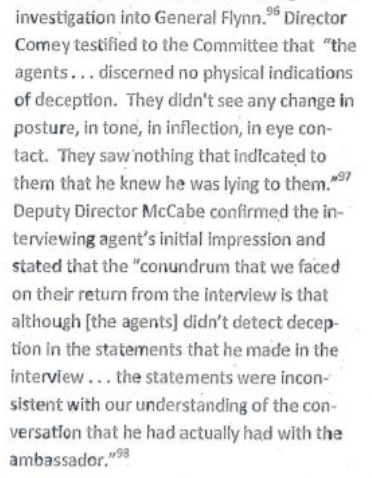Andrew C. McCarthy has an article this morning that argues that the FBI had no justification for redacting certain information from the House Intelligence Committee Report on Russia. McCarthy’s piece is titled Outrageous Redactions to the Russia Report and argues that “the redactions had absolutely nothing to do with concerns about the need to protect national security or pending investigations.” The redactions in question deal with Michael Flynn, and here’s how McCarthy summarizes what the redacted passages do:
- Elaborate on why the FBI did not believe Flynn had lied, including quotations from Comey’s testimony.
- Reveal that for some period of time during 2016, the FBI conducted a counterintelligence (CI) investigation of Flynn.
- Note that top Obama Justice Department and FBI officials provided the committee with “conflicting testimony” about why the FBI interviewed Flynn as if he were a criminal suspect.
- Illustrate that the FBI and Justice Department originally insisted on concealment of facts helpful to Flynn that are already public.
I’ll take issue with his characterization of the first point. The redacted passages reveal that, according to a report compiled by partisans, Jamey Comey testified that the FBI agents who interviewed Flynn did not notice physical signs of deception.
You can access comparisons of some of the key redacted and unredacted passages in these useful tweets from Sean Davis:
Let me blow up the relevant passage to make it easier to read:

That does not sound like a passage about “why the FBI did not believe Flynn had lied, including quotations from Comey’s testimony.” It sounds like a passage about why the FBI believed that Flynn had said something about his own conversations that they believed to be untrue, and had to reconcile that with the fact that the agents who interviewed Flynn did not detect “physical indications of deception.” (My emphasis.)
Overall, though, the reason for the redactions does not jump out at me.
I’d still want to hear from DOJ and FBI before finally concluding beyond any doubt that there was no need for the redactions. For example, could the fact that there was a counterintelligence investigation of Flynn have been classified? And could that explain any of the redactions? Remember: the mere fact that something is publicly known does not automatically mean that a redaction of a reference to that information is improper. After all, we know that even classified information that is leaked and becomes public is still considered classified.
But arguments like this, if they might arguably justify some of the redactions, don’t seem to justify all of them. For example, McCarthy cites a redacted passage containing information that has already been disclosed in “a document submitted to the court by Special Counsel Mueller when Flynn pled guilty” and notes:
It is a public document. . . . [W]hat conceivable good reason can there have been for the FBI and Justice Department to redact from the report information that was already publicly disclosed? Why black out public information showing that Flynn merely did what any Obama official, or any other U.S. official, would have done — namely, suggest that Russia would only make things worse by escalating the dispute?
As to the propriety of the redactions, I think it looks bad for the FBI, DoJ, and the Trump administration. Put me in the “this sure looks like a problem, but I’m withholding final judgment” camp. (The nice thing about this camp is that it’s not very popular. There are always spots available!)
Two final points.
First: classification is sometimes done for legitimate reasons and sometimes for illegitimate reasons, as I noted in 2006:
Sometimes information is classified by the government because it’s proper to do so.
Sometimes information is classified by the government because it’s embarrassing to the government. If you don’t know this, you should do more reading. Try reading Irreparable Harm by Frank Snepp, for starters.
How do we decide which is which, if we’re not going to be told what the information is?
Which leads to my second point. In the first instance, we put the onus on the president. And indeed, McCarthy puts the ultimate blame for all of this on Donald Trump, noting that the president has the authority and duty to make sure redactions are proper:
It is simply ridiculous for President Trump to continue bloviating about this situation on Twitter and in friendly media interviews, and for congressional Republicans to continue pretending that the problem is Justice Department and FBI leadership — as if Trump were not responsible for his own administration’s actions. The president has not only the authority but the duty to ensure that his subordinates honor lawful disclosure requests from Congress.
. . . .
Republican committees can carp all they like about Deputy Attorney General Rosenstein. The buck stops with the president.
Some consider it impolite to point this out, but the president doesn’t really read. If he did, he might be better positioned to second-guess his administration’s judgments about redactions. But he doesn’t, so he will learn about this when he sees it on teevee or an aide tells him about it.
More to come, I’m sure.
[Cross-posted at The Jury Talks Back.]



